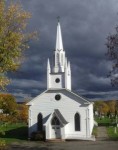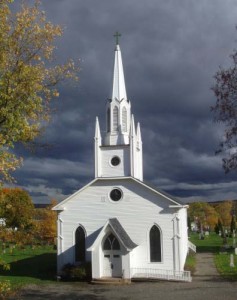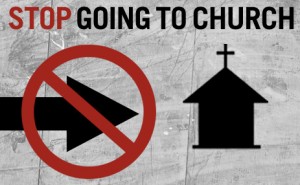 This is a guest post Brandon Chase. Brandon is a baseball player at heart; a practicing Crossfitter, golfer, hoopster and guitarist; fueled by meat, cappuccinos and chocolate. He writes about learning to Live by the Life of Jesus Christ on his blog Zōē Perissos. He is married to his high school sweetheart, Marie, and has two daughters McKinley and Delaney. They live in Fort Worth, TX.
This is a guest post Brandon Chase. Brandon is a baseball player at heart; a practicing Crossfitter, golfer, hoopster and guitarist; fueled by meat, cappuccinos and chocolate. He writes about learning to Live by the Life of Jesus Christ on his blog Zōē Perissos. He is married to his high school sweetheart, Marie, and has two daughters McKinley and Delaney. They live in Fort Worth, TX.
Like Zōē Perissos on Facebook or follow Brandon on Facebook, or Twitter.
If you would like to write a Guest Post for the Till He Comes Blog, begin by reading the Guest Blogger Guidelines.
Do you remember doing Science Fair projects in school? You know, the ones where you did an experiment in order to answer a question, solve a problem, or explore a “what if?”
I’m certainly glad I’m not in 7th grade anymore, and don’t have to whip out my tri-panel display board and fret over whether the Judges are going to like my project. But, I do have an experiment, while hypothetical, that I’d love to see tested:
What would happen to the Church – the Body of Christ, if it were forced to exist without:
- Officially designated church buildings or offices
- Paid, full-time vocational ministers
- Institutional or otherwise officially organized groups or factions
- Tithes, Budgets or Ministry Plans
As I stated, I realize this experiment is an anecdotal exercise. Truly, it would take an extreme set of circumstances (or… a magnificent move of God) to arrange a new playing field such as this.
But what if?
What would you do if you woke up one morning, and suddenly, as if in an alternate reality, you learned that following your Lord, practicing and growing in your faith – being a Christian – had to be done differently…
What if…
 What if there were no “churches” to “go to?”
What if there were no “churches” to “go to?”
What if there were no buildings where Christians gathered once or twice per week?
What if there were no “Ministers?” No “Pastors?” No “Preachers?” No “Leaders?”
What if there were no denominations? No groups of like-minded people who practice the same theological or doctrinal expression and traditions?
What if there were no institutions to which you would tithe or give? There were no tax deductions? No budgets directing the allocation of funds or mission statements or plans dictating ministry form?
You would have prayer, the Bible, and people – but none of the above.
What would you do? How would you move forward? What would happen to the Church?
What would happen to the world?
Hypothesis: Revival
I am giddy as I fantasize about this query.
Can you imagine? The Body of Christ being released into the wilderness – amongst the darkness and danger and wolves of the world – with no “church” building to retreat to on Sunday, no “Pastor” to listen to week after week, no tribe to look for answers in tradition and no tax motivation or direction on where to give money?
To many, this sounds like chaos.
To me, this sounds like Heaven on earth. This sounds like the Ekklesia. This sounds like the Body under the Head. This sounds like the Bride in radiant Oneness with Her Groom. This sounds like the Family of God. This sounds like a dwelling place for the Lord.
This sounds like Jesus.
It was He in fact who said He was sending us out like sheep amongst the wolves. He said just as He is Light, so too are we, shining in the darkness. He said that the world was dangerous, but that He had already overcome it, and that we were the real dangerous ones in Him.
He also said He was the Head of His Body, the Church. He would lead; we would be equal, united and mutually beneficial members to each other, and the Body as a whole.
He said that as sheep, we listen to His voice and hear Him, as He leads us, and we follow.
He said there was no room for division or faction – only Him.
He said nothing about giving a certain percentage. He asked for everything. He did not direct ministry. Ministry is His Life – and It is to be taken everywhere, all the time, as He directs.
These were the simple, but profound instructions a small group of followers received from their Lord. They didn’t have buildings they erected and gathered in. They didn’t place titles on certain people or create offices around them. They knew nothing of denominations. They were not given percentage of giving or mission plan guidelines.
Instead, they gathered with each other, two or more at a time, at varying points in the day, every day, in as many varying forms and expressions as possible.
When they gathered, Christ, by the Holy Spirit, “lead” the meeting. He set the agenda. He was the agenda. He was expressed and His Life was given, and out of that expression and Life came mission direction and action – always in the form of humility, service and Love. Money and possessions and resources were given freely, generously, spontaneously and continuously – with no thought to percentage or personal benefit. Ministry was organic, dynamic, and viral.
Their simple, but powerfully obedient response to their Lord’s commission, changed the world.
The early Christians did not have anything that we do not have today. In fact, they had so much less. But the advancement of the Kingdom and the Life of Jesus was so much more explosive in their time.
This begs the question:
How did the early church do so much with so little? And… How are we doing so little with so much more?
And these are indeed good questions. But they are not the best question, which is:
What do we have now, that they didn’t have, that may be hindering the Kingdom?
While the answers to that question cannot be fully treated in one article, might I submit that in part, they include:
- The modern day church building as the form and function of what we believe to be “church;” and if “gone to,” the primary function and practice of Christians.
- The submission to, and sometimes idolatry of those in the position of “Pastor” or others in “Leadership,” to the point where, under the clergy/laity caste, the Priesthood of all Believers, and the identification of and free functioning in Spiritual gifts is retarded.
- The division of the Body of Christ into many thousands of dis-unified parts, many of which give no more than lip service to the Lord Jesus Christ as the Head.
- The oftentimes abused teaching of tithing, and the door that it closes to creative opportunities to be generous in giving and serving and loving outside of a corporate bank account and budget.
God is not hindering His work in our age. He has not designed that this time be marked with less power and wonder and expansion of His Kingdom.
No, man has done that.
Maybe, just maybe, this little experiment should not be anecdotal or hypothetical at all.
Maybe, we’ve always had the prescribed steps, ingredients and answers to this all along?
We have Him. He is all we need.
Maybe He is calling His children to get ourselves – our stuff and our ideas, out of the way…
…and follow.








 No, I’m not telling you to stop attending church.
No, I’m not telling you to stop attending church.
 Jesus said that we would always have the poor with us (Matt 26:11).
Jesus said that we would always have the poor with us (Matt 26:11). 